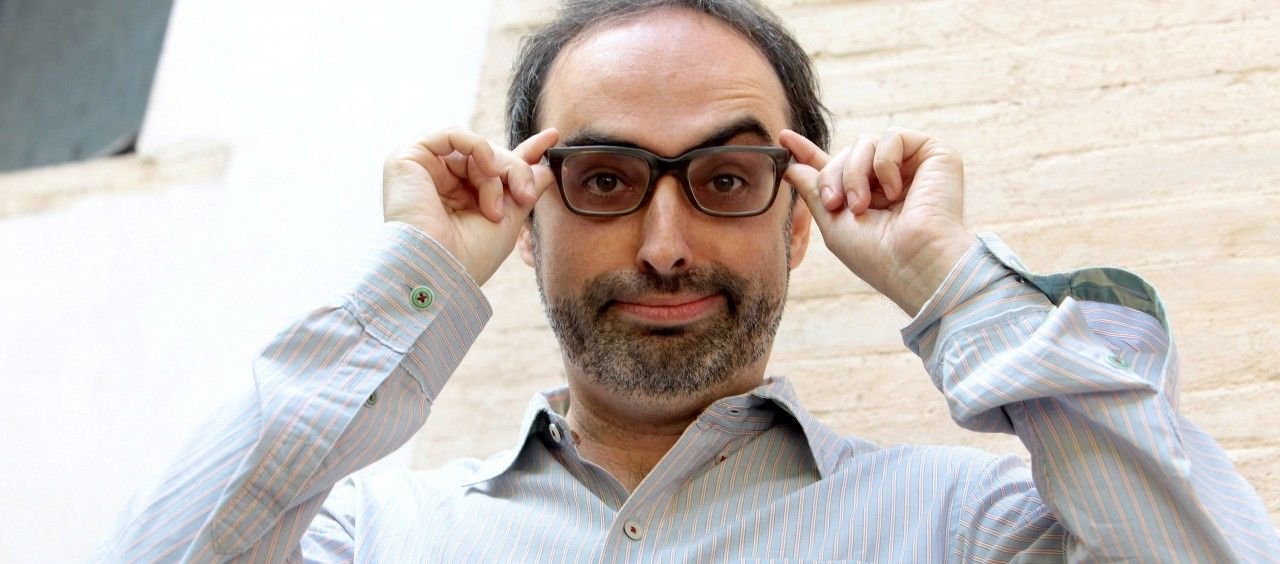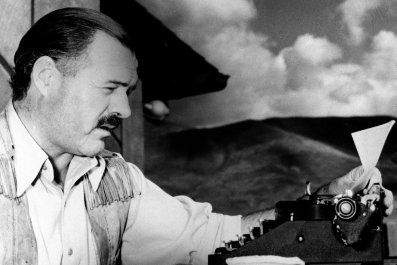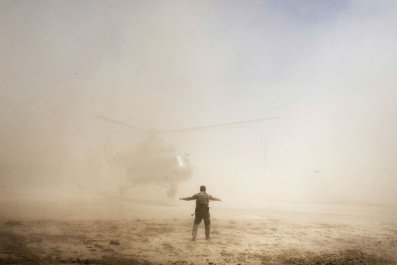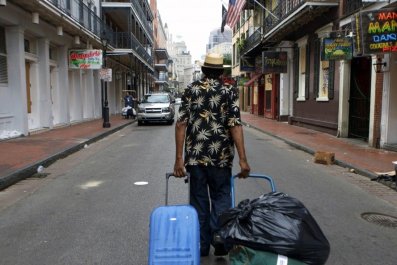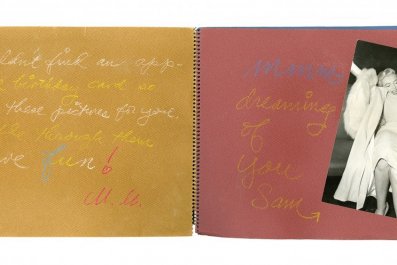Gary Shteyngart is a liar. For a good decade now he has been writing novels under that name, never once revealing that it is a nom de plume - he was born Igor Semyonovich Shteyngart in 1972 at the Otto Birthing House, in what was then the Soviet city of Leningrad. He only became Gary later, in Queens, "so that I would suffer one or two fewer beatings" at the hands of his suspicious American classmates. Well, what he gained in bodily security back then he today loses in this reader's faith. Igor!
Shteyngart has been quite skilled at the artful form of lying known as fiction ever since his debut novel, The Russian Debutante's Handbook, was published in 2002. That immigrant picaresque earned the sort of effusive reviews that can cause a writer to lose friends, though in his second novel, Absurdistan - a dark post-Soviet romp - he dismissed his debut as The Russian Arriviste's Handjob, suggesting some restlessness about his writerly persona. His third effort, Super Sad True Love Story, is probably his finest; the dystopian novel even converted skeptics like The New Republic's whipsmart Ruth Franklin, who called it "a satire that strikes painfully at many of our culture's weakest spots."
Now, finally, Shteyngart is ready to tell the truth. I met him at the 2nd Ave Deli in Manhattan, where we feasted on brisket and pastrami, drank Dr. Brown's Cel-Ray sodas and talked about his new memoir, Little Failure, the only recent book I can think of dedicated in all seriousness to an author's psychotherapist.
As we split a latke the size of Azerbaijan, Shteyngart reminisced about his first novel's success: He was an Oberlin graduate working toward a master's degree in creative writing when Riverhead Books pulled him out of anonymity, gave him a lot of money and agreed to publish what he now calls his "silly book."
"It was 11 years ago," the famously hirsute Shteyngart says, "but it seems like it was 150 years ago. Back then, being a writer, there was nothing better than that. Now you're just a farm team for some bigger parts of the cultural industry." He says that what little's left of American high culture shifted away from literature with The Sopranos, which he argues was television's first serious bid for sophistication. Now, like the rest of us, he watches Mad Men. Reading a book these days, he says, requires almost-impossible focus in the face of endless distraction. He recently finished Middlemarch - getting through it was "like going to the North Pole."
At the same time, Shteyngart readily admits that his trajectory has been "as good as it gets in literary fiction." A decade ago, I saw him share a reading with another novelist in the KGB Bar in the East Village, where smoke occluded walls covered in Soviet kitsch. Shteyngart was drunk, ribald, loquacious. It was a literary comedy show, especially when he laid on the Russian accent. The other novelist approached the lectern to share a lesson he'd learned the hard way: "Never f**cking read after Gary Shteyngart."
Back then, Shteyngart was still an unknown. Today, he is as close to stardom as any American writer can hope to be. The video trailer for Little Failure features James Franco, whom Shteyngart taught at Columbia, and Jonathan Franzen - whose critiques of American society have a hint of hostility absent from Shteyngart's own fiction - oh, and Alex Karpovsky and Rashida Jones.
Shteyngart may have it pretty easy, living with his wife and son near Gramercy Park, swimming daily at the Equinox gym, visiting his therapist "only" four times a week and spending long stretches of the year at a house in the bucolic Hudson River Valley. But it was not always so. When the tides of Soviet-Jewish immigration deposited him in Queens, he was a "short, dark and furry" creature lost in a world of "pure Technicolor." Little Failure is about the struggles of a "strange salami-smelling boy with some aptitude in math" - though, luckily, a lot more aptitude with language. It may be true, as Norman Podhoretz wrote in his memoir, Making It, that "one of the longest journeys in the world is the journey from Brooklyn to Manhattan." But the journey from Kew Gardens in Queens is even longer.
And that journey - chronicled to some extent in all of Shteyngart's work, whose irrepressible humor disguises a Nabokovian love of the English language and an astute grasp of human psychology - has left Shteyngart longing for an earlier version of New York. He bemoans the sanitized, bike-laned metropolis of Mayor Michael Bloomberg, so unlike the snarling, scruffy city he prowled while a student at Stuyvesant High School in the bad old days of the late 1980s. I jokingly suggest that then mayor-elect Bill de Blasio could resurrect those times, as some Manhattanites fear. Shteyngart lights up with a devilish grin. "Let's hope he drives the city into the ground."
Shteyngart is in a tricky situation: He is popular not only for his writing, but for the role he occupies within the literary community - the hairy prankster, the vodka-loving Russian, the neurotic Jew. These are all stereotypes, but they have helped sell books. His ludicrously effusive blurbing of other writers' books - the subject of a 2012 documentary, in which I make one flip remark - is both a comment on the self-importance of the literary community and a clever way to stay relevant in that gang. Shteyngart could occupy his cozy literary niche forever, but he clearly wants to transcend it.
Having finally told his own story in Little Failure, he intends to write a book "that doesn't have a Russian-Jewish protagonist at its center." That's almost inconceivable, since Shteyngart has mined the psyche of our troubled peoples as thoroughly as Philip Roth has of Newark's native Jews. And yet he says his next book will be a thriller "with a strong female character."
Strength isn't a quality the hero of Little Failure seems to possess. Shteyngart was born in 1972, thrust almost at once into "the strange, unbidden beauty of being a sickly child." Reflecting on a picture of himself at about 2 years of age, he notes that his face in the photograph is that "of a mother in 1943 who just received a fateful telegram from the front." He asks his mother today why he had looked so terrified back then, and she answers with brutal simplicity: "Because you were born a Jewish person."
Every successful immigrant is a shape-shifter. By the age of 5, Shteyngart had decided he would be a writer, inspired in good part by the Swedish book The Wonderful Adventures of Nils and the Wild Geese. By 10, in America, he was a Republican who read the National Review, by 16 a "terrible student" at Stuyvesant, from there he headed to Oberlin College, which "would allow me to lose my virginity to an equally hirsute, stoned and unhappy person in the least humiliating way possible," as he writes in Little Failure. There, in the oddly progressive hinterlands of Ohio, he became a stoner known as "Scary Gary" who wasn't exactly taxed academically: his most intense assignment during freshman year apparently involving a viewing of Blade Runner. (Shteyngart claims that he is persona non grata at the college he routinely excoriates in his fiction.)
After doing a halfhearted postgraduate imitation of Bartleby the Scrivener, Shteyngart landed at the creative writing program at Hunter College, where he quickly earned the praise of novelist Chang-Rae Lee. This was 2000, when it was "still possible to woo a girl with a book deal." That book came out shortly after 9/11, when many New Yorkers were just about ready to laugh at their city again. Shteyngart and his hero, Vladimir Girshkin of the Emma Lazarus Immigrant Absorption Society, left them with no other choice.
And though Shteyngart is often joking, a surprisingly somber side comes across both in person and in Little Failure. The book is forthright about Shteyngart's fraught relationship with his father and his equally fraught relationship with Russia. The dedication to the psychotherapist does not seem nearly so funny when you finish reading this memoir.
As we dispense with our sandwiches, Shteyngart freely admits that his life has been governed by an "overwhelming sense of anxiety," a long-standing lineage of Hebraic dread that he would like to not pass on to his son. "Fatherhood is great: I'm very cuddly, he's very cuddly. He says 'meow' for some reason."



